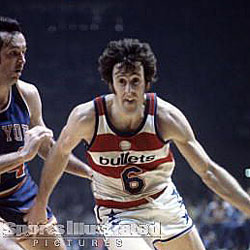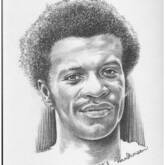An excellent athlete and a relentless rebounder and defender, the 6'8 Hankinson averaged 28 points and 17 rebounds as a senior at Great Neck North, and went on to a stellar college career at Penn, anchoring teams that went 74-11 in his three years. He was a two-time All-Ivy League pick and was named team MVP in 1973. In Penn's upset of Providence in the 1972 NCAA tournament, he held future ABA and NBA star Marvin "Bad News" Barnes to seven points on 3-of-10 shooting. Barnes still holds the Providence single game scoring record of 52 points, and was the ABA Rookie of the Year and a two time ABA All-Star. After college, Hankinson was selected by the Boston Celtics in the second round of the NBA Draft. A highly regarded prospect who seemed to fit perfectly into the Celtic mold, he suffered a bad knee injury in a summer league game after his rookie season that robbed him of his athleticism and ended his playing career the following year.
NOTE: Do you have a photo of Phil Hankinson that we can use?
PHOTOS
A 6'4" guard/forward from Great Neck known for his aggressiveness and non-stop style of play, he attended Holy Cross High School in Queens and Providence College. Riordan was a key member of two NCAA Tournament teams during his time at Providence. In his junior season, he posted averages of 10.3 points and 9.1 rebounds during the Friars run to the Elite Eight. He was selected in the 12th round of the 1967 NBA Draft by the New York Knicks and outplayed first round pick Bill Bradley in preseason workouts to earn a spot on the team. Riordan went on to play nine seasons (1968-1977) in the NBA as a member of the Knicks and Bullets (now called the Wizards), and was the key player in the trade that brought Earl Monroe to the Knicks from the Bullets. He scored 6,334 points in his career and won an NBA Championship with the Knicks in 1970. In 1972-73, Riordan averaged 18.1 points, 4.9 rebounds and 5.2 assists in leading the Bullets to a Central Division title and playoff appearance, earning NBA All-Defensive Second Team honors. In the 1975-76 season, he averaged 15.4 points per game and led the Bullets to the Eastern Conference Finals and a 60-22 record.


Mike Riordan
Phil Hankinson
 | ||||
G
G
Great Neck Basketball
LEAGUE
